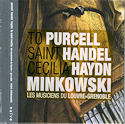 To Saint Cecilia
To Saint Cecilia
Les Musiciens du Louvre, Grenoble; Marc Minkowski
Naïve V5183
Cecilia, patron saint of music, was martyred: her killers would surely have been more benign if they had listened to the celestial music dedicated to her. Purcell, with his Hail Bright Cecilia of 1692, shows why English music-lovers came to establish festivals dedicated to Cecilia. Listen to the tenor voice of Anders Dahlin in “‘Tis Nature’s Voice” and bass Luca Tittoto in “Wond’rous Machine!” to hear why. There is one irony in Hail, Bright Cecilia. Purcell uses the human voice in all its beauty to sing the praises of musical instruments - which hardly get the chance to express themselves.
Handel’s A Song for St Cecilia’s Day is lively in its Overture; baroque orchestral music at its most serene. Add the cello-playing of Niels Wieboldt in “What Passion Cannot Music Raise” and Florian Cousin’s flute-playing in “The Soft Complaining Flute” and you will see how Handel gives freer rein to instruments than Purcell.
And then Haydn, with the more religious approach of the St. Cecilia Mass. The female soloists come into their own: contralto Nathalie Stutzmann and above all, soprano Lucie Crowe. Listen to the latter in Haydn’s “Quoniam”; if anyone can claim to be called the Cecilia of these two CDs, it is Ms Crowe.
And don’t just set aside 2 hours 33 minutes for the recording: immerse yourself in the 132-page booklet of insightful articles and sumptuous paintings.
Michael Schwartz



